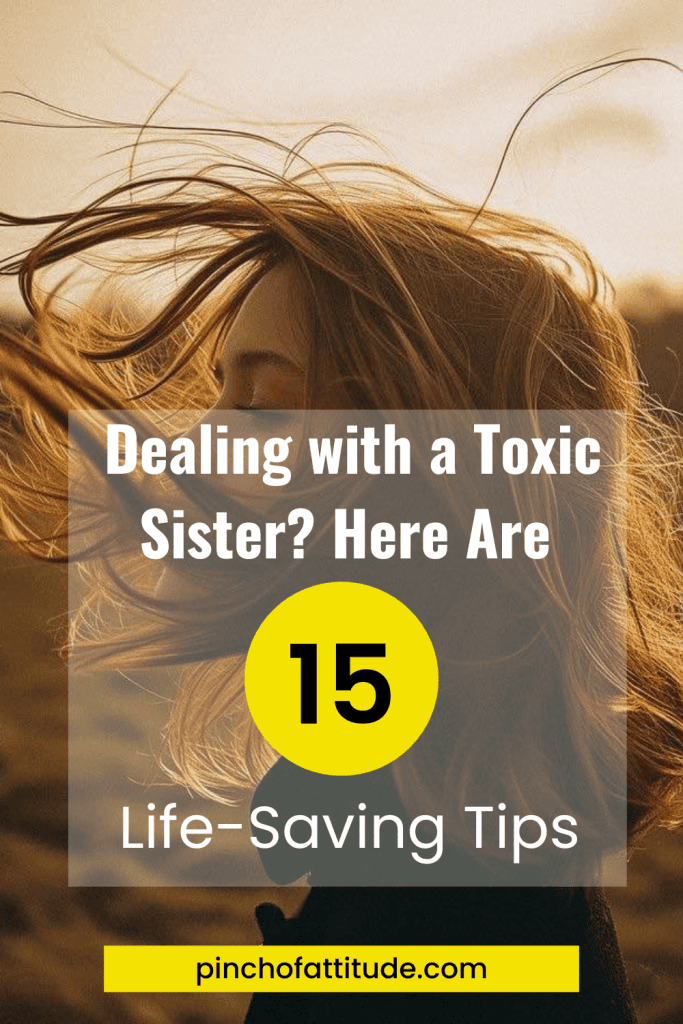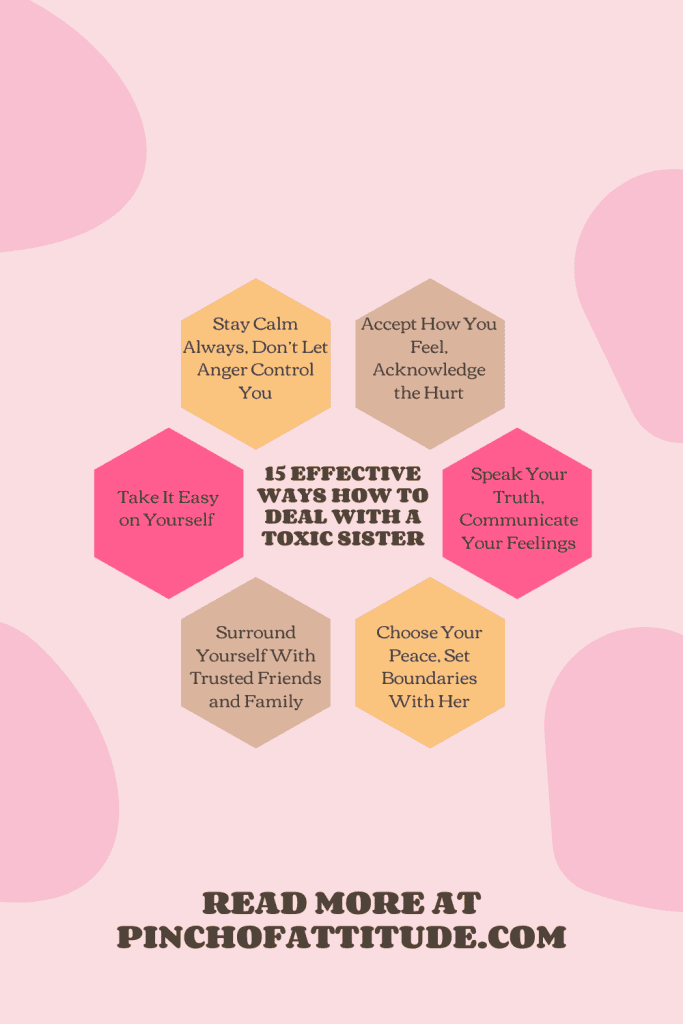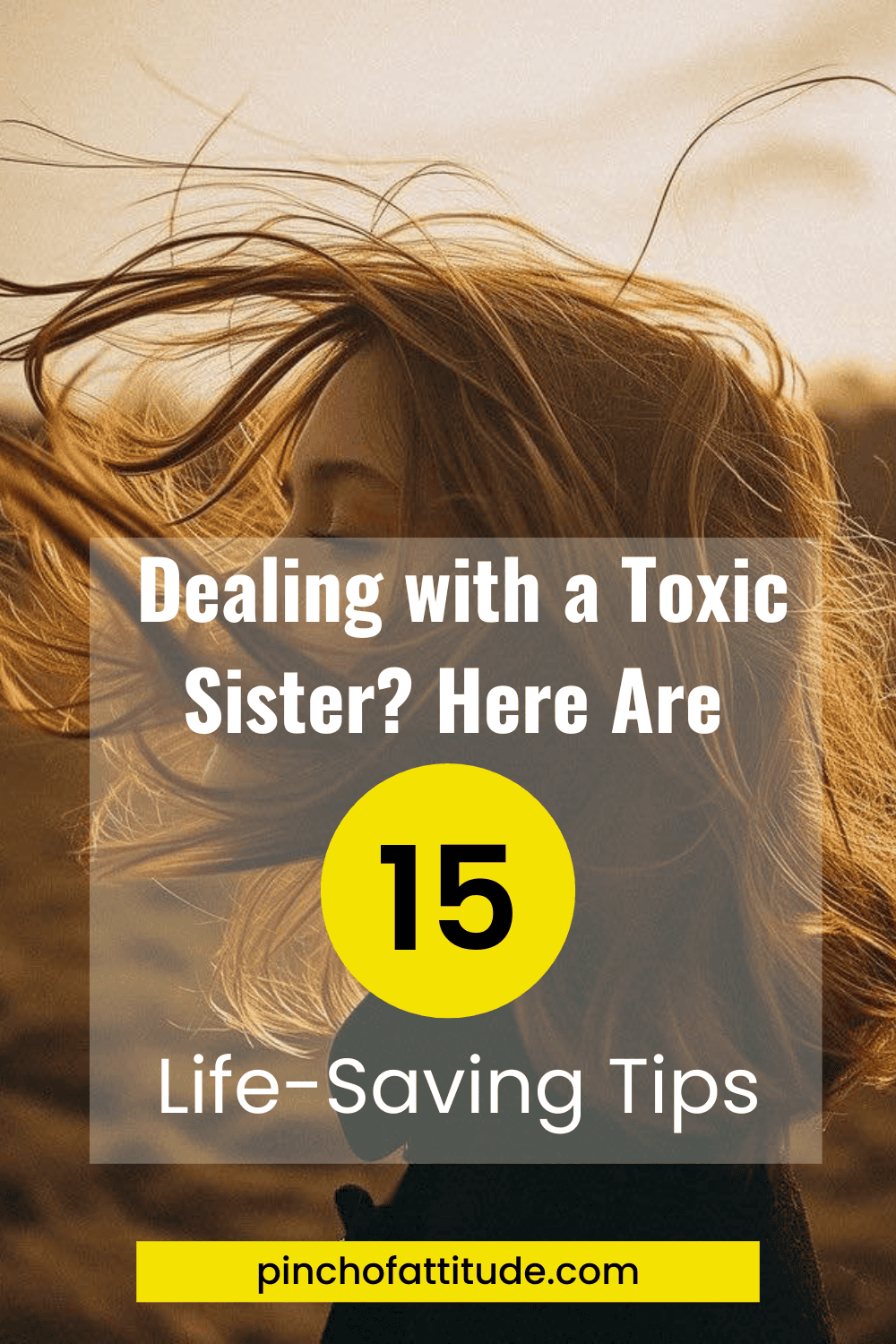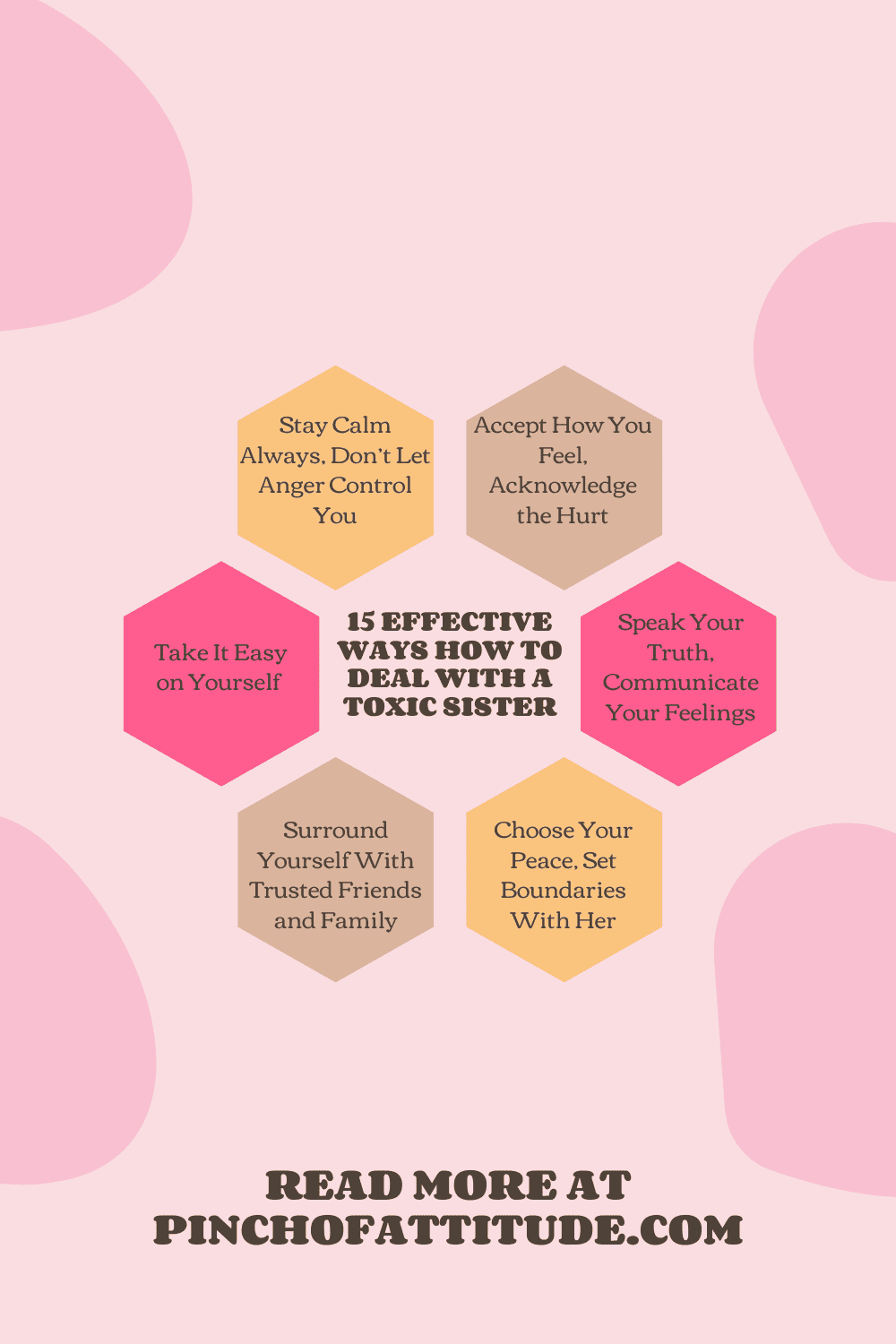Having a brother or sister can be amazing, but sometimes they can also be…well, toxic.
Like, instead of harmless squabbles over the remote, it’s more like navigating a minefield of negativity.
Trust me, I get it.
My sister, let’s just say, isn’t exactly sunshine and rainbows. Plus, growing up with a narcissistic mom who sees her as the golden child definitely didn’t help.
I spent years looking for ways to cope, learning and unlearning how to deal with a toxic sister. And if I was able to reclaim my peace, one powerful step at a time, you can too.
Below, I’ll share with you my story and how I found the courage to finally say enough is enough.
- You can decide not to engage in her drama. Instead, focus on activities that bring you joy and build healthy relationships that nourish you.
- It’s not selfish to choose your well-being. Set boundaries to protect your emotional energy and prioritize relationships that uplift you.
- Healing is a journey, not a destination. Be patient with yourself, celebrate your progress, and seek support if needed.
Table of Contents
15 Effective Ways How to Deal With a Toxic Sister

Learning how to deal with a toxic sibling relationship can sometimes make you feel stuck.
However, I speak from experience when I say that it’s always possible to move beyond the drama and find peace.
Here are the 15 actionable steps I took to dodge my sister’s negativity and protect my sanity:
1. Accept How You Feel, Acknowledge the Hurt
Acknowledging the pain and the unfairness was my first step to healing.
For years, I tried to downplay the sting of my sister’s toxic behavior, brushing it off as just normal sibling rivalry.
But in a dysfunctional family where favoritism ran rampant, it was more than just squabbles. It was constant put-downs, emotional manipulation, and feeling invisible.
And ignoring it only festered the hurt.
Recognizing the signs you have a toxic relationship with your sibling is not about dwelling on the negative, but about understanding the reality of the situation.
Only then could you start making choices that empower you, not just react from a place of hurt.
2. Speak Your Truth, Communicate Your Feelings
Keeping quiet felt safer for a while, like avoiding a hornet’s nest. But I realized that staying silent fueled the power imbalance in my relationship with my sister.
It was time to reclaim my voice.
It wasn’t about yelling or accusations. It was about communicating my feelings honestly and assertively. “I don’t appreciate your comments,” I’d say, “they hurt me.”
Of course, a toxic sibling may guilt-trip you, try to twist your words, or even throw a tantrum.
But remember, you’re not responsible for their reactions. Stand your ground and let your sibling know of your boundaries.
Tip
Communicate your feelings, even if it’s uncomfortable. Speaking your truth means you can finally set boundaries where your voice is heard and respected.
3. Choose Your Peace, Set Boundaries With Her
It might sound harsh, but I learned that one of the best ways to deal with toxic siblings is to put distance (physical and emotional) between you.
So, I set clear boundaries, from limiting phone calls to opting out of family gatherings. I’m not punishing her, I am protecting my peace.
Yes, you can’t control their behavior, but you can decide how much power your sibling could have over your life.
Distancing yourself from her will allow you to breathe, to create a space where you aren’t constantly bombarded by negativity.
4. Surround Yourself With Trusted Friends and Family
If your sibling is always dragging you down, it’s not surprising to feel isolated and alone. That’s why surrounding yourself with trusted friends and family is crucial.
For me, my cousins were my saviors during those tough times. They were the ones who saw through the drama, validated my feelings, and offered a safe space to vent and laugh.
Don’t underestimate the power of a supportive friend and his influence on your life.
It could be anyone. Maybe you have younger siblings to uplift you or a mentor who can offer guidance.
These positive connections can become your anchors, reminding you that healthy relationships do exist.
5. Take It Easy on Yourself and Learn to Appreciate Who You Are
It can be emotionally exhausting when you’ve tried everything to fix your relationship with your sibling but still see no change.
I’ve bent over backward, suppressed my own needs, and swallowed my hurt, all in the hope of things changing.
But that’s when I thought it may be time to stop.
Our relationship could be toxic, but I didn’t want to reach the point where I became toxic too. It’s not my fault she doesn’t want to change.
Instead of blaming yourself, focus on appreciating who you are. That is the foundation for building a healthy, fulfilling life.
6. Stay Calm Always, Don’t Let Anger Control You
My sister thrived on drama. One snarky comment from her could send me spiraling into anger and frustration. But that was in the past.
It took practice, but I discovered the power of staying calm.
When she starts trying to push my buttons, I don’t engage. Instead, I take a deep breath, use calming techniques like visualization, or even leave the room.
It wasn’t easy but not lashing out broke that cycle of negativity.
This doesn’t mean you’re choosing to be a doormat. It’s about choosing your battles and responding with grace, not rage.
Tip
Don’t let your sister’s negativity dictate your emotional state. Your peace is precious, so guard it.
7. Heal Your Heart, Focus on Your Emotional Recovery
I spent years carrying the weight of hurt, anger, and resentment. But I realized that staying stuck in that pain only kept the cycle going.
So, healing became my priority.
No, my goal wasn’t to erase what happened. That’s impossible. What I focused on was learning to process my emotions, forgiving myself, and moving forward.
A healthy relationship with a sibling isn’t always attainable. But you can have a healthy relationship with yourself.
Love yourself unconditionally, set limits to protect your emotional well-being, and engage in activities that nourish your soul.
Remember, self-care isn’t selfish.
8. Accept the Unchangeable, Manage Your Expectations
For the longest time, I clung to the hope that my sister would change. I tried to “fix” the situation, fueled by the belief that I could control the outcome.
But eventually, I had to confront the harsh truth: you can’t force someone to change.
It’s important to take things for what they are, even if it’s painful. Let go of unrealistic expectations and accept that your toxic sibling may never change.
This doesn’t mean you’re condoning their negative behavior, but rather choosing to focus on what you can control: your well-being, growth, and happiness.
Tip
Wishful thinking won’t rewrite reality. Accept the truth that your sister won’t change so you can finally start focusing on your happiness instead.
9. Meet in Neutral Spaces, Protect Your Energy
Do you ever find yourself on edge, walking on eggshells to avoid triggering an outburst? That was my life growing up.
So, to protect my energy during unavoidable interactions, I started suggesting neutral spaces.
A coffee shop, a park, even a quick phone call instead of a full-blown family dinner – these neutral environments provided some distance and reduced the potential for escalation.
Of course, even in neutral spaces, your sibling may get snippy or try to stir the pot. That’s when the art of reciprocity comes in.
If she starts getting negative, politely excuse yourself or shift the conversation to a neutral topic. Remember, you’re not obligated to engage in negativity.
10. Learn Ways to Cope With the Toxicity, Consider Therapy
For me, a turning point came when I started therapy. After six months of processing my trauma from my narcissistic mom and sister, I felt a shift.
My therapist provided a safe space to explore my emotions, develop healthy coping mechanisms, and understand the dynamics at play.
A mental health professional can help you navigate the complexities of your difficult relationship with your sister.
Even better, they can equip you with tools to manage your emotions, set boundaries, and build resilience.
Tip
Don’t hesitate to seek help. Investing in your mental health is an investment in your future.
11. Create Your Inner Peace, Develop Coping Mechanisms That Work for You
Developing healthy coping mechanisms is your toolkit for creating your inner peace, regardless of the external chaos.
For me, mindfulness practices like meditation and deep breathing helped me center myself, manage stress, and respond to my sister’s negativity with calm and clarity.
Remember, what works for me might not work for you. Experiment and discover what resonates with your unique needs.
It might even be something as cliche as limiting contact. After all, you don’t have to constantly be in each other’s lives to have a sibling relationship.
Of course, doing these things doesn’t mean that your sibling relationships would magically transform overnight. But it will help you create a space where negativity loses its power.
12. Release Resentment, Let Go of All the Hatred You Have Toward Her

My resentment towards my sister felt like a shield. It protected me from her negativity, but it also weighed me down.
That’s when I realized that holding grudges isn’t the best way to protect myself. On the contrary, it was keeping me stuck in the past and not allowing me to heal.
My good friend back then urged me to try to understand my sister’s behavior. Was it her upbringing, past hurts, or something else?
Releasing resentment doesn’t mean forgetting the past or condoning her actions. It’s about choosing your peace and freeing yourself from the emotional burden.
You won’t become best friends, but it does create space for healing and allows you to move forward with a lighter heart.
13. Reflect on Your Reactions and Grow from Each Experience
It’s easy to get caught up in the negativity of your toxic sibling’s actions. But remember, every interaction, even the painful ones, holds the potential for growth.
For me, reflecting on my reactions became a powerful tool.
After an argument, I wouldn’t just focus on the hurtful words. I’d ask myself things like, “Could I have responded differently? What boundaries could I set next time?”
This introspection isn’t about self-blame, but about identifying patterns and developing healthier coping mechanisms.
By understanding your triggers and emotional responses, you will learn to communicate assertively, set clear boundaries, and prioritize your well-being.
Tip
Don’t shy away from self-reflection. Instead, use it as a tool to handle future interactions with greater clarity and strength.
14. Practice Meditation, Bridge Understanding
I found immense power in cultivating my inner peace through daily meditation.
My five- to 10-minute practice before bed helped me center myself amidst the chaos of my sibling’s negativity.
Fueled by anger and hurt, you may often feel like you’re locked in a power struggle. But stepping back will allow you to see your sister with fresh eyes.
Started asking, “What’s beneath her negativity? What makes you tick? What experiences shaped her into who she is?”
By seeking to understand, not just react, you’ll start navigating your family relationship with greater clarity and less emotional charge.
15. Prioritize Your Emotional Well-Being, Sometimes Distance Is Mandatory
For the longest time, I tried to handle a toxic sibling and her behavior head-on, hoping things would change.
But the truth is, sometimes the healthiest choice is to prioritize your well-being, even if it means creating distance.
It wasn’t easy, but setting healthy boundaries, including physical and emotional distance, was a turning point.
That said, don’t make the mistake of equating distance with abandonment.
Choosing to distance yourself doesn’t mean cutting her off forever. It means creating space, respecting your limits, and prioritizing your emotional well-being.
And who knows? Perhaps with time and space, your relationship can evolve into something healthier and more mutually beneficial.
Why Do You Need to Set Clear Limits With Your Toxic Sister?
Setting clear boundaries with your toxic sister is very important because it shields your emotional well-being from their negativity. This isn’t about shutting them out completely but creating healthy limitations to protect yourself from maltreatment, gaslighting, and other harmful behaviors.
Toxic people drain your energy, chip away at your self-esteem, and can even lead to depression and anxiety.
In my experience with my dear sis, her constant belittlement and emotional manipulation took a toll. I felt constantly on edge, questioning my reality, and struggling with low self-esteem.
But when I stayed firm in my boundaries, that’s when things started to change for me.
I was able to create space for joy, peace, and personal growth.
By setting boundaries, I reclaimed my emotional energy, allowing me to invest it in relationships that uplift and support me.
I got to prioritize self-care practices that nurture my well-being and rediscover activities that bring me joy.
There were moments of guilt and confusion. But deciding to cut ties meant I could stop seeking her approval and focus on building healthy relationships instead.
Today, I have a life filled with genuine connection, self-compassion, and the freedom to be myself, authentically and unapologetically.
Tip
Don’t be afraid to create distance, especially if you’re doing it to protect your peace. Sometimes, self-love means setting boundaries.
Related Posts:
- Toxic Sister Relationships: Harmful Effects, Signs & Tips on How I Deal With Mine
- When You Should Let Go of Your Toxic Sister? My Personal Experience
- How I Managed Anger and Resentment Towards My Toxic Siblings?
- Finding Closure in Toxic Sibling Relationships: What I Did
- How to Cut Ties With a Toxic Sister Before Losing Your Mind
Frequently Asked Questions
What causes a toxic sister?
A toxic sister may stem from underlying personality disorders, including narcissistic, borderline, or antisocial personality disorders.
How can you stop being affected by your toxic sister?
To minimize the impact of a toxic sister, limit contact, seek therapy, focus on self-care, and build a supportive network.
Are there long-term consequences to maintaining a relationship with your toxic sister?
Yes, maintaining a relationship with a toxic sister can lead to lasting emotional distress, trauma, and compromised mental health.
How do you deal with toxic family members that you currently live with?
Communicate calmly and prioritize self-care. Consider professional help while letting them know how their behavior affects you.
Should you involve other family members in addressing the toxicity, or is it better to handle it individually?
It depends on the situation. Involving the rest of the family can provide support, but for some issues, it may be more appropriate to talk to a parent.





What if even after doin all and telling her firmly she doesn’t understand healthy boundaries and who herself is selfish all the time and calls you one instead.